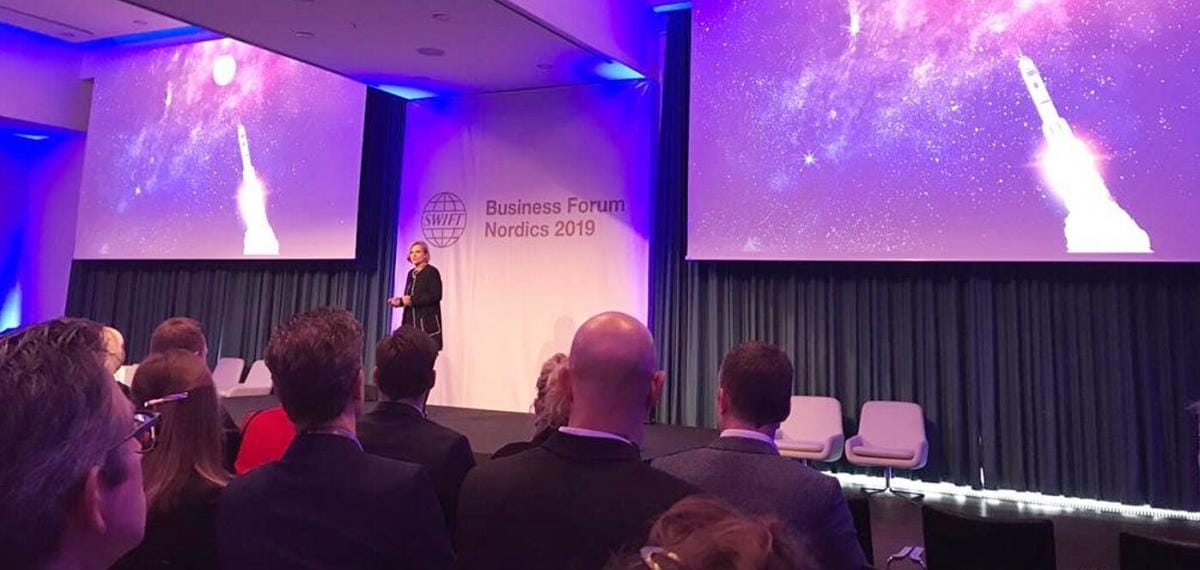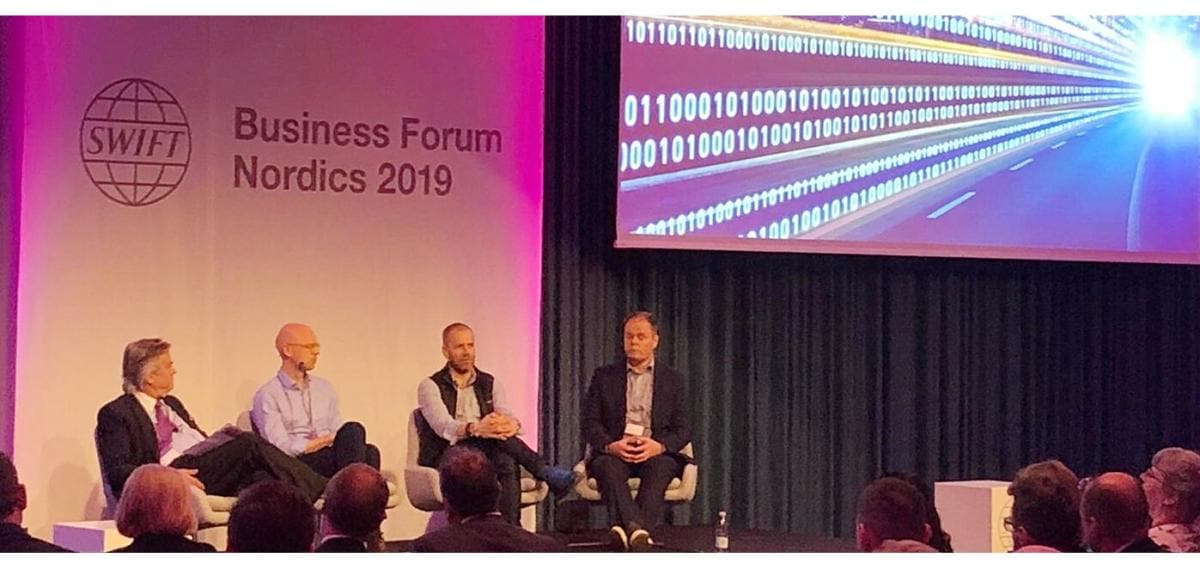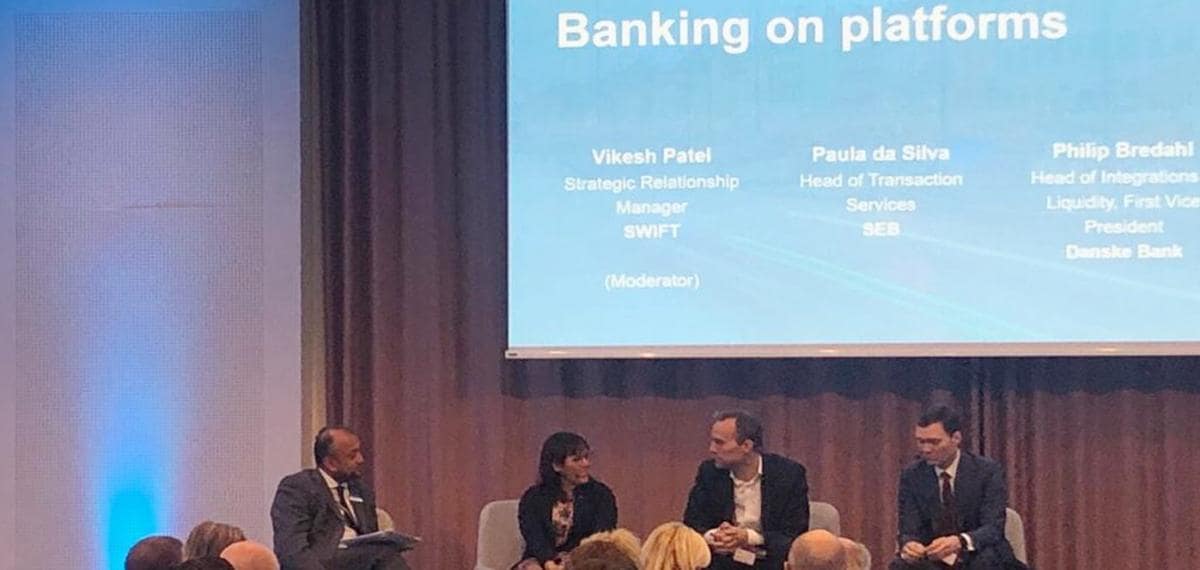Swift’s Business Forum Nordics 2019 charts the digital transformation of financial services
The financial industry is moving into uncharted territory. Technology is transforming banking– delivering new value and efficiencies in financial services, driving up customer expectations, but also creating new risks. This is how Cate Kemp, Swift’s Head of UK, Ireland and Nordics, neatly set the tone for the Swift Business Forum Nordics 2019 in her opening address. “New technologies are creating a wealth of opportunities, but also a wealth of challenges. As a community, we must join together and collaborate to meet this challenge and deliver the digital experience of the future,” said Kemp.

Opening address: Cate Kemp, Head of UK, Ireland and Nordics, Swift
Held on 28 March in Copenhagen, the event welcomed over 250 guests from the world of banking, technology and beyond to debate some of the critical questions facing the industry today – How can the Nordic financial community harness technology in order to deliver a truly digital customer experience? Should banks join platforms or become the platform themselves? How can the sector improve risk management and thwart the ongoing cyber threat?
Innovation and opportunities in payments
Payments innovation was put under the lens in the panel discussion, ‘Delivering a fast and frictionless payment experience’, with a particular focus on the challenges institutions have to reengineer their systems to meet customers’ growing expectations. Martin Georgzen, Head of Payments Development with Danske Bank, noted that challenges go throughout the value chain when it comes to establishing instant payments, highlighting that the central bank was not set up for the demands of 24/7 payments system.

Panel debate: Delivering a fast and frictionless payment experience
For instant payments to succeed, collaboration, transparency, and understanding how to connect systems is key, Georgzen said, noting that there are nine different payment platforms in the Nordics alone, and banks also connect to a wide variety of corporate ERPs.
Dag-Inge Flatraaker, Senior Vice President, New Business/Payments at DNB, noted that banks also need the infrastructure in place not only to prove that payments can flow instantly, but also to demonstrate that they can handle the risks of transactions moving instantly.
Establishing AI in financial services
The capacity for AI technologies to transform financial services was the subject of debate in a plenary session. Jacob Bock Axelsen, Lead Data Scientist in Advanced Analytics and Information Management with Deloitte Consulting, noted that he sees some institutions that do not want anything to do with AI because they do not see how it applies to them. He advised that all banks should be exploring its potential for their business at one level or another.

Panel debate: The rise of artificial Intelligence in financial services
Mattias Fras, Head of AI Strategy & Acceleration for Nordea, added that AI is visible in banking chatbots. Building trust is a reason it is taking a while for AI to take off in financial services, Fras suggested, arguing that this is still at a fairly simple level so far; but Antti Myllymäki, Head of Artificial Intelligence at OP Financial Group, did note that chatbots take care of around 70% of customer enquiries at some banks.
The platformification of financial services
Another significant change in financial services is the ‘platformification’ of banking - where a financial services platform, hosts a variety of applications - products and services - from a variety of providers. In the banking space, platforms open the possibility for partnerships between financial institutions and innovative players such as fintechs, which can extend customer reach and save costs.
PSD2 and other open banking programmes are effectively forcing banks to become a platform to some degree said, Bent Dalager, Partner NewTech and Financial Services for KPMG suggested. At the same time, cloud-based business services are also driving this. Big Techs are active in the platform space and have been for some time – and now they offer banking services.

Panel debate: Banking on platforms
During the session a point of particular debate was around whether banks should be on platforms, or literally become platforms themselves. Paula da Silva, Head of Transaction Services with SEB said that she does not believe that banks should be the platform themselves, but rather be accessible through platforms. By contrast, Philip Bredahl, Head of Integrations & Liquidity, First Vice President at Danske Bank, commented that his ideal is that the bank becomes the platform. However, he did note that the challenge in this scenario is not to become invisible, because if you become invisible you can be replaced.
Risk mitigation through collaboration
Although these are exciting times for the industry, the cyber threat remains. Digging into this topic, Alain Desausoi, Swift's Deputy CISO & Head of Technical Security, underlined that institutions could be a victim, whether they are a direct target or not.
Lance Ryan McGrath, CISO with Danske Bank said that it is hard to prioritise one cyber threat over others, as it changes on a daily basis. Banks have to try to cover all bases. The challenge with cyber is that it is a risk discipline, McGrath pointed out. Much like with AI, banks cannot just buy cyber security off the shelf and expect it to suit their organisation. He said that banks need to know how much is the right amount of cyber security for them, how much investment they want to allocate to it, and what their risk tolerance is – these can be hard decisions to balance.
Collaboration in the community is particularly important when it comes to cyber security. There is a clear need for banks to be connected on cyber defence as customers need to trust the entirety of the market, not just trust one or two banks, McGrath said. He added that the level of open communication in the Nordics is a cultural benefit that banks in this part of the world have.
Looking Ahead
Although it was noted by many throughout the day that the Nordics is a highly digitalised region compared to virtually anywhere else in the world – in order to remain secure and compete in the marketplaces of the future, Nordic financial institutions must continue to embrace transformation and harness the power of new technologies. For a full overview of the Swift Business Forum Nordics, check out the Finextra live blog.


